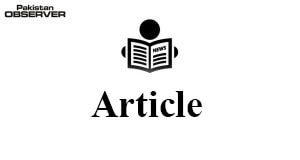Social, governance reforms for sustainable economy
WORLD is going through a most severe crisis since World War-II. The COVID-19 pandemic has exposed the fragility of global economic system. Leaders around the world are standing at the crossroads. Environmental, social and governance challenges are exacerbating underlying economic and social inequalities.
The widespread impact of the coronavirus pandemic has revealed a significant vulnerability in corporate value creation system.
The investment community is now at an inflection point on how to assess the risks in corporate value creation cycle.
While everybody is preoccupied with the negative impact on the global economy, the pandemic is demanding widespread awareness on the urgency of implementing sustainability investing and environmental, social and governance (ESG) reforms.
To rethink sustainability of this planet, tectonic ESG focused developments are taking place around the world. The European Commission is revising its Non-Financial Reporting Directive.
The International Organization of Securities Commissions (IOSCO) has set out its intention to accelerate the harmonization of sustainability standards.
US Securities and Exchange Commission (SEC)?has amended its rules to enhance human capital disclosures.
The International Financial Reporting Standards (IFRS) Foundation has agreed to consult on broadening its mandate to include sustainability issues.
The International Federation of Accountants (IFAC) has called for the creation of an International Sustainability Standards Board to sit alongside the International Accounting Standards Board (IASB) under the auspices of the IFRS Foundation.
Meanwhile, the leading voluntary framework and standard setters including Climate Disclosure Project (CDP), the Climate Disclosure Standards Board (CDSB), the Global Reporting Initiative (GRI), the International Integrated Reporting Council (IIRC) and the Sustainability Accounting Standards Board (SASB) have for the first time committed to work towards a joint vision.
These developments form the natural building blocks of a single, coherent, global ESG reporting system for sustainability of corporate value creation system.
Businesses operates within a broader society and industry context. They are deeply intertwined with environmental, social, and governance concerns. Strong ESG proposition creates tangible value for the economy.
The E in ESG, environmental criteria, includes the energy that companies consume and the waste they discharge, the resources they need, and the consequences for living beings as a result.
E encompasses carbon emissions and climate change. Every company uses energy and resources; every company affects, and is affected by, the environment.
Social criteria, addresses the relationships companies have and the reputation they foster with people and institutions in the communities where they do business. S includes human capital relations and diversity and inclusion.
G, governance, is the internal system of practices, controls, and procedures companies adopt to govern themselves, make effective decisions, comply with the law, and meet the needs of external stakeholders. ESG focused investments have experienced a meteoric rise now toping $30 trillion.
The acceleration has been driven by heightened social, governmental, and consumer attention on the broader impact of corporations, as well as by the investors and executives who realize that a strong ESG proposition can safeguard a companies’ long-term success.
World Economic Forum advocates the principles of “stakeholder capitalism”. This concept is championed for half a century and stated in the Davos Manifesto.
International Business Council (IBC) of WEF comprising of 140 CEOs of large corporate is at the forefront of rebalancing of corporate purpose through stakeholder capitalism.
IBC has spearheaded a commitment to align their corporate values and strategies with the UN’s Sustainable Development Goals (SDGs), to better serve society.
There is an emerging consensus among companies that long-term value is most effectively created by serving the interests of all stakeholders.
Stakeholder Capitalism Metrics have been developed by an outstanding task force of experts dedicated to the project by the four CEOs of largest accounting firms EY, KPMG, PwC and Deloitte, as well as members from Bank of America and the World Economic Forum who coordinated the process and synthesized its outcomes.
The “Stakeholder Capitalism Metrics” (SCM) provide disclosure framework to align economic value creation their mainstream reporting on performance against environmental, social and governance indicators and?track their contributions towards the SDGs on a consistent basis.
The metrics are deliberately based on existing standards, with the near-term objectives of accelerating convergence among the leading private standard-setters and bringing greater comparability and consistency to the reporting of ESG disclosures.
The Stakeholder Capitalism Metrics can provide verification and assurance, to enhance transparency and alignment among corporations, investors and all stakeholders.
Stakeholder Capitalism has is 21 core metrics and 34 expanded disclosures. Core metrics are primarily quantitative measures for which information is already being reported by many firms in different formats or can be obtained with reasonable effort. They focus primarily on activities within an organization’s own boundaries.
34 Expanded metrics tend to be less well-established in existing practice and standards and have a wider value chain scope or convey impact in a more sophisticated or tangible way, such as in monetary terms.
Investors and stakeholders now expect companies to report on non-financial issues, risks and opportunities with the same discipline and rigor as financial information.
By reporting on these recommended metrics in its mainstream report and integrating them into governance, business strategy and performance management, companies demonstrate to its shareholders and stakeholders alike that it diligently weighs all pertinent risks and opportunities in running its business.
Corporations that align their goals to the long-term goals of society, as articulated in the Sustainable Development Goas, are the most likely to create long-term sustainable value, while driving positive outcomes for business, the economy, society and the planet.
The government needs to consider ESG Metrics seriously and should form a high-level council for review and adoption of these metrics to facilitate sustainable corporate value creation system in Pakistan.
—The writer is Chairman Pakistan HR Standards Committee.










